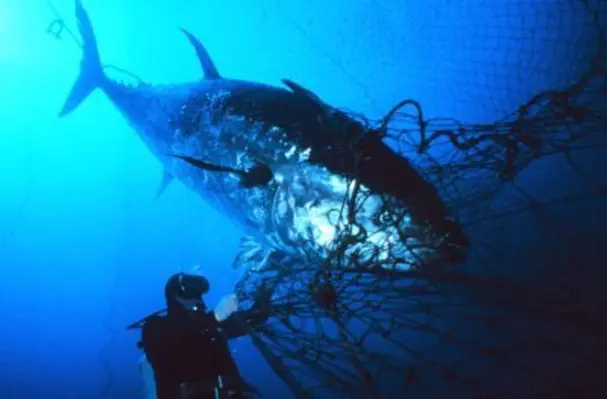Page 2 of 2
Although there’s no action yet from the WCFPC, Greenpeace is hoping that Filipino tuna fishers would realize FAD’s alleged destructive results to the marine environment as the valuable bigeye tuna is now overfished and yellowfin, skipjack and albacore tunas are all in decline and that “WCFPC is also partly to blame because it failed to follow its scientific device of reducing tuna catches.”
High and dry?
The province of General Santos is the country’s tuna hub because of its proximity to the tuna-rich fishing grounds of the Moro Gulf, Sulu Sea, Mindanao Sea and Celebes Sea. As the province is not often visited by devastating typhoons and its availability of facilities such as wharves, canneries and an airport, General Santos City is called the ‘Tuna Capital of the Philippines’.
But because of the ban, the province is now experiencing production problems that have not been experienced by fishers before. In a data provided by the Philippine Fisheries Development Authority, the total tuna landing of city’s port complex dropped by 21 per cent from 143,138 tonnes in 2010 to 112,891.81 tonnes last year. The volume of landings in mature yellowfin tuna has been on the decline from 33,369 tonnes in 2007 to a mere 9,061.13 tonnes in 2011. According to General Santos-based journalist Edward Espejo, the 2011 landing is an indication that more than 90 per cent of raw materials for the city’s six canning plants have been sourced from abroad (74.7 per cent at 53,010.04 tonnes) or from Manila (16.6 per cent at 11,796.11 tonnes). For this reason, Espejo says tuna players have come to terms that unless conservation measures are instituted, tuna catch will continue to decline which could pose serious problems for the country.
Despite the ongoing fishing ban, Tan believes that this could help replenish their stocks as the areas covered by the ban lie in one of the strategic migratory paths of tuna and tuna-like species will be closed to commercial fishing.
However, city officials are appealing to lift the ban and allow medium size purse seiners (or medium size boats) to fish in the high seas off Palau, Micronesia, Papua New Guinea and Indonesia where Filipino fishermen are often “caught” in the territorial waters. Authorities say the ban has impacted the province’s economy and of the entire tuna industry where employees are composed of “ordinary, poor fisherfolks”.
But commercial fleets are also affected by the ban. According to General Santos City’s local government, around 160 fishing vessels were forced to recall their operations that significantly reduced fishing expeditions by commercial tuna fishers. Adding to the woes is the increasing prices of fuel which grounded both small and big fishing fleets. In order for the industry to be sustainable, Tan said the Philippine fishing vessel should be reduced to not more than fifty which was largely protested by fishers. Tan said the government should set aside at least US$28.47mn) to address to cushion the impact of reduced fishing vessels. He revealed that some operators have already sold their super seiners because of increased production costs.
According to Espejo, as local tuna production began to decline, canning plants have been cutting production hours by a third, from the usual 24/7. Operations are now at two production shifts and sometimes just once a day. Despite the declining Philippine catch, Filipino canned tuna exporters seem to have not been affected as they were able to put up canneries in Indonesia and Papua New Guinea.
But the government admits that it is high time stakeholders have to explore ways to diversify. Agriculture Secretary Proceso Alcala said industry players must look into a number of prospects that can be pursued such as shifting into aquaculture or mariculture or planting mangroves in the coastal waters to counter the impact of declining marine fish volume.
Espejo says that even key players in General Santos have acknowledged that the industry might be facing a long term crisis due to continuous increase of production costs, depleting marine habitat and global economic meltdown. Espejo reveals that out of 10 families in General Santos during the industry’s heydays which spanned from 1960s to early 2000, only three are left and even the likes of Tan who owned one of the biggest commercial fleets went outside the fishing business as the “glory days of tuna might be over”.
Nevertheless, industry players are hoping that given mitigation measures plus the right policy moves, the Philippine tuna industry might still recapture its lost crown.
Gemma Delmo




